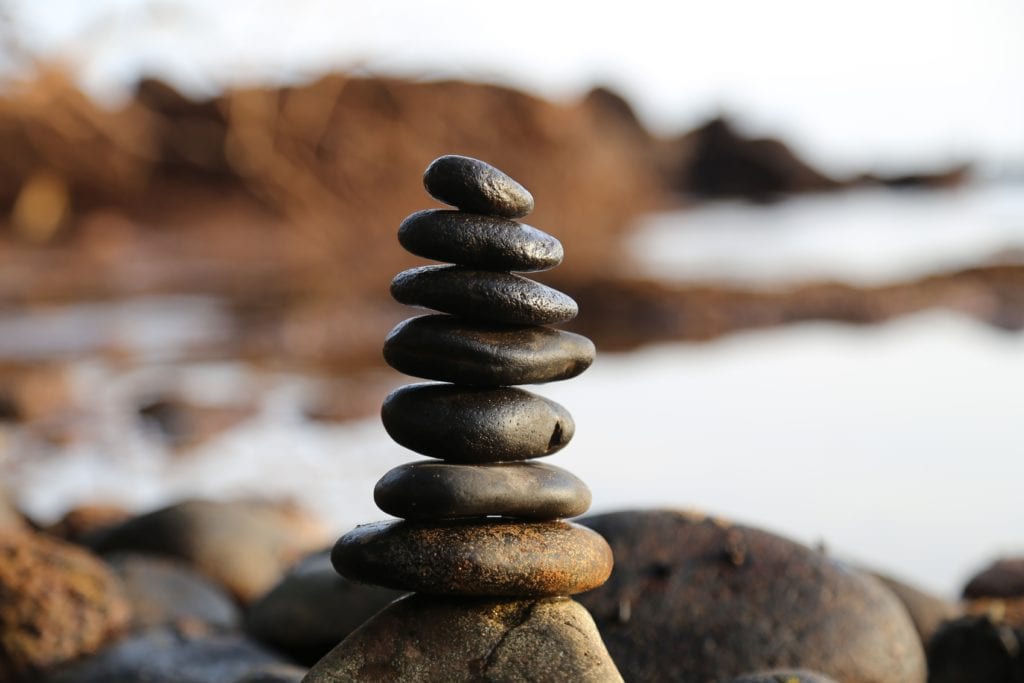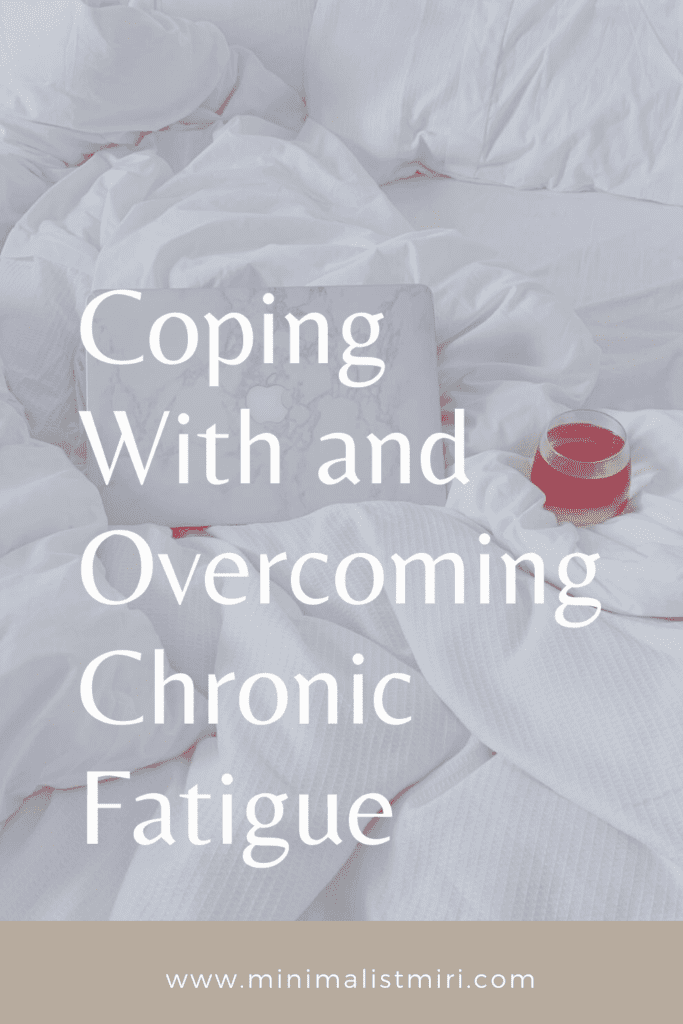I’ve been dealing with severe fatigue for years, hence the chronic. Chronic fatigue is demoralising, depressing, and exhausting. Many times, it feels endless and overwhelming. Canceled plans with friends, days spent doing little more than laying in bed, and, unlike many other conditions, few treatment options are out there. After years of experiencing chronic fatigue, there was a definite need to change the way I was doing things. I was desperate and willing to try anything, but from my experience managing chronic fatigue even small changes, over time, produce a positive impact.

Finding the source of one’s chronic fatigue is imperative. There are so many factors that can cause chronic fatigue, and it often requires detailed journaling of symptoms and discussions with healthcare professionals. My chronic fatigue stemmed largely from endometriosis. So, as well as finding ways to lessen my fatigue, it also meant finding ways to best control endometriosis flare-ups and manage pain (sadly, neither of which is easy). I do, however, hope to share some posts in the near future on how I have managed to decrease my endometriosis pain using largely natural methods.
Take Time Off
This is easier said than done, especially if you’re not in a position to take an extended period away from work or school. That being said, squeeze in more time for rest when you can. Cancel any unnecessary plans on the weekends, ask for help with tasks around the house, either go to bed or earlier or sleep in later, use holiday time not for an active holiday but to simply rest.
One of the best ways I’ve managed to regain my energy after years of chronic fatigue is simply resting more. It was difficult to hit pause between my master’s program and starting my own business, but it was fully necessary.
That being said, using time off — whether it’s canceling evening plans, taking a month off from school, or using up your vacation time — productively is crucial. All too often, when I’m fatigued and in pain, I want to lay in bed and watch Youtube videos, Netflix, and browse Facebook. While nothing is inherently wrong with these things, moderation is crucial. Activities such as meditation, restorative yoga, and/or listening to audiobooks give our eyes a much-needed rest and give our bodies more time to concentrate on resting and healing. I personally cannot recommend restorative yoga (plenty of great videos on Youtube) enough! One of my favourites is Yoga With Bird’s restorative videos.
Other gentle activities include crafting, reading, baking, taking a bath, stepping out into nature, practicing an instrument, colouring, drawing, writing, tending to houseplants, or exploring tea or coffee brewing. There are numerous options. Especially if you are able to take a longer break to give your body time off, these activities can help you feel busy enough that you don’t get bored.
Care for your nervous system // Herbal support
Caring for the nervous system has been crucial for me in overcoming my chronic fatigue. This has come not only in the form of taking time off and resting, thus decreasing my stress, it has also been helped by herbs and supplements.
Any herbs and supplements that I list are simply ones that I’ve found success with. Always consult with your healthcare practitioner before starting new herbs/supplements and ensure you don’t have allergies or sensitivities to any of the herbs.
- Nervine herbs
Nervine herbs are herbs that support the nervous system and can help create feelings of calm and relaxation and decrease background stress. One of the wonderful things about nervine herbs is that many of them are very easily accessible and can be enjoyed as herbal infusions (tea), either on their own or in combination. A few nervine herbs include:- Lavender
- Chamomile
- Catnip
- Lemon balm
- Peppermint
- Rose
- Thyme
- Hawthorn
- Nettle
- Nettle is one of my all-around favourite herbs. Nettle has anti-inflammatory properties, is classified as an alternative herb (meaning it helps to restore the body’s health over time), and is loaded with vitamins (like A and C) and minerals (like calcium and iron).
- I’ve found that, to see the benefits of nettle, it has to be consumed regularly for at least a month or two. Some people really like the taste of a plain cup of (dried) nettle tea. It took me a while to get used to the almost salty taste of nettle, and I find that using 1 part nettle, 1 part peppermint in a cup of tea provides maximum benefit and can help mask the flavour of nettle if you don’t like it.
- Astragalus root tincture/supplement
- I discovered astragalus root while living in China. I purchased dried slices of astragalus root from the supermarket’s tea section, thinking it was enjoyed as a daily tea rather than used as a herbal medicine (although plenty of people do enjoy astragalus root tea regularly). I, unfortunately, could not stand the taste of astragalus root tea, whether on its own or in a blend of herbs.
- Astragalus root is an adaptogen, meaning it helps the body respond to and cope with stress. Additionally, astragalus is immunomodulant, meaning it helps support the immune system. I like to think of it as working on the immune system in the background. It does not overstimulate the immune system the way some herbs (like elderberry, for example) do. For me, astragalus has been a way to support my immune system and help with ongoing stress.
- Today, there are plenty of online stores that sell astragalus root in supplement and tincture form. However, always make sure the supplier is reputable and you are indeed receiving high-quality astragalus root.
- Prebiotic and probiotic supplement
- Good digestion is critical for overall health and wellbeing. Stress — which is so prevalent at all times but especially so when dealing with chronic fatigue on top of all of life’s other challenges — can harm our gut biomes. A supplement that contains both prebiotics and probiotics provide maximum benefits to our digestive health. Although on the more expensive side, refrigerated probiotics are considered the best form of probiotic to take. That being said, fermented foods can also provide excellent support, such as miso soup, kimchi, sauerkraut, and yogurt.
- Vitamins D and B12
- These are two supplements I’m sure to take with regular frequency. Depending on where you live, it’s easy to be unable to get enough vitamin D from sunlight alone. Here in Scotland, in the winter months, the sun’s angle makes it almost impossible to get enough on a daily basis. Low vitamin D can cause fatigue, which makes overcoming existing chronic fatigue even more difficult.
- Equally, low vitamin B12 is relatively common, regardless of the diet one eats. As a dairy-free vegetarian, however, it is even more important to make sure I’m supplementing B12, as vegetarians and vegans are at a higher risk of low B12. Like low vitamin D, low B12 can cause fatigue, which can worsen existing fatigue.
- Blood tests can confirm if you’re low on either, and, if so, your doctor may need to provide higher supplements of B12 or vitamin D. As always, consult with your doctor or a pharmacist regarding the right amount of a supplement to take.

Eat Well
A healthy diet has been essential in managing my chronic fatigue. While I can’t say that it’s transformed my life and healed my chronic fatigue, eating a whole foods diet (i.e. largely eliminating processed food, like crisps, candy, and soda) has helped keep some of the worst fatigue at bay.
Sometimes certain foods can act as triggers to worsen fatigue. Equally, being too strict with one’s self can be counterproductive and result in more stress. It’s all about balance, and over time I’ve found which foods (related to my endometriosis) worse my fatigue (like fried or greasy foods), while other times, savouring a treat (like a cookie or slice of cake) is worth a bit of bloating and exhaustion later. What’s important is to find a healthy diet that is maintainable rather than perfect.
Eating well doesn’t have to be expensive, particularly when cooking from scratch, but healthy eating can definitely be time-consuming and difficult to do when dealing with chronic fatigue. Foods like rice and beans, hearty vegetable soup, smoothies, and yogurt with lots of fruit and nuts are some of my go-to meals when I’m especially low on energy. I also find that making meals in bulk and making meals to freeze when I do have surplus energy can be very helpful on days when I’m feeling fatigued.
Ease Into Exercise
At its worst, my chronic fatigue has been so bad that even walking upstairs was enough to cause me to need to lay down for several hours. Even going out for a slow walk would deplete all the energy I had, and when you have commitments going on, it’s impossible to prioritise exercise.
Easing into exercise, however, has been crucial for me to overcome the worst of my fatigue, as it helps to build stamina. Restorative yoga is a wonderful place to start, as you can even do it in your bed. It’s a wonderful way to not only heal both physically and emotionally, but it also stretches sore muscles and gives your body movements it would not otherwise get throughout the day. As you become accustomed to more movement, you can add in other things, like gentle workouts (again, plenty of Youtube videos), short walks, or beginner’s yoga.
Building up to more strenuous workouts does take time, and I’ve found taking the pressure off myself was necessary, and I stopped trying to make myself schedules for workouts or even yoga. Some days are better than others. We all start somewhere, and just taking that first step can really help.
Connect to Nature
I seem to mention connecting with nature in just about every post I make, and that’s because nature is so soothing and healing. Even a few minutes of fresh air can boost our spirits tremendously. Chronic fatigue is more than just physical sensations. Having no energy for such a long period of time easily lends itself to depression, anxiety, and general upset. Just being outside, listening to the birds or watering plants, is a mood booster that anyone can enjoy.
When getting out of bed feels like too much, opening the window for a fresh breeze can be a nice change. Or, when things are really tough, even playing some ambient nature music on Youtube can have a calming effect.

Share Your Experience
Finally talking about my chronic fatigue to friends and family has definitely made things easier. I’d feel tremendously guilty for not responding to messages from friends or spending my evenings laying down rather than spending quality time with my husband, but I didn’t have the energy to do anything but lay there. As soon as people learn what you’re experiencing, they tend to be understanding. In some cases, other people around you may also be dealing with chronic fatigue. Keeping the experience to yourself only adds to feelings of stress, which makes recovery harder.
Additionally, there are numerous wonderful articles, blogs, and vlogs out there detailing individuals’ experiences with chronic fatigue. For many, finding a support group or reaching out to a counsellor or therapist may be too exhausting; finding forums and groups online can be a wonderful place to start reaching out or sharing your own experience.
I hope these tips have been at least of some help. It’s definitely an uphill battle to manage and overcome chronic fatigue. Since taking time to rest and focusing on my diet and wellbeing, and by incorporating exercise, I’m having more good days than ever before, with my energy returning to normal levels rather sporadically. If there’s something else that’s helped with your chronic fatigue, I’d love to hear from you!
